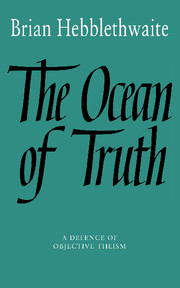Book contents
- Frontmatter
- Contents
- Preface
- 1 Christian belief in God
- 2 The ebbing of theistic faith
- 3 The interiorisation of faith
- 4 Theism in the modern world
- 5 The significance of Kant
- 6 The grounds of theistic belief
- 7 The question of truth
- 8 Religions – theistic and non-theistic
- 9 Life after death
- 10 The Christian Church and objective theism
- Appendix: The Church's ministry
- Notes
- Select bibliography
- Index
7 - The question of truth
Published online by Cambridge University Press: 06 July 2010
- Frontmatter
- Contents
- Preface
- 1 Christian belief in God
- 2 The ebbing of theistic faith
- 3 The interiorisation of faith
- 4 Theism in the modern world
- 5 The significance of Kant
- 6 The grounds of theistic belief
- 7 The question of truth
- 8 Religions – theistic and non-theistic
- 9 Life after death
- 10 The Christian Church and objective theism
- Appendix: The Church's ministry
- Notes
- Select bibliography
- Index
Summary
The issue at stake between voluntarists and realists in religion is a question of truth. The voluntarist argues (or assumes) that it is not true that there exists an objective God, Creator of heaven and earth. The realist, by contrast, argues – along the lines, for example, of the last two chapters – that belief in an objective God is true. Another way of putting the difference is to say that, for the voluntarist or expressivist, religious truth is not a matter of stating, as far as human language can, how things ultimately are and will be with God, man and the world, but rather a matter simply of how one lives and of what ideals guide one's policies, commitments and choices. This point is sometimes made – very confusedly – by saying that the word ‘true’ means something different in talk of God from what it means in talk of tables and chairs and the people in the room.
Undoubtedly, talk of God is very different from talk of chairs and people, and of course it is religiously and theologically essential to bring out the differences. But there is no need, indeed it is quite improper, to make the concept of truth a victim of these differences and to suppose that an expressivist or voluntarist view of religious language allows us to mean by the truth of God no more than the value of one's highest ethical and spiritual ideal.
- Type
- Chapter
- Information
- The Ocean of TruthA Defence of Objective Theism, pp. 102 - 113Publisher: Cambridge University PressPrint publication year: 1988



